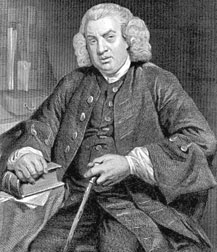Coming to grips with Johnson’s Dictionary
|

Dr Samuel Johnson: A lexicographer
is a writer of dictionaries; a harmless
drudge, that bruises himself in tracing the original and
detailing the signification of words. |
Today lexicography or compiling of dictionaries has become a refined
art. In our own country, there were a few lexicographers who rendered a
yeoman service without the aid of modern technology. Prof G.P.
Malalasekera and Dr E.W. Adikaram were pioneers in compiling
English-Sinhala dictionaries. They are still being used by scholars.
However, for speakers of British English, the ‘dictionary’ means the
Oxford Dictionary. For Americans, it is the Webster Dictionary. However,
for nearly one and a half centuries, ‘the dictionary’ meant Johnson’s
Dictionary.
Dr Samuel Johnson goes down history as the compiler of the first
English dictionary. Unlike other works such as Chambers, Collins,
Cambridge and Longman dictionaries, Johnson’s Dictionary was a work of
art for he gave examples from classical literature for the definitions
of words. For Dr. Johnson, compiling a dictionary was a monumental task
as he had no other dictionary to consult.
In the absence of any other dictionary to consult, Johnson depended
heavily on the Greek philosopher Aristotle who reasoned that definitions
should state what words meant, rather than what they did not mean. On
the other hand, Johnson also turned to John Locke’s Essay Concerning
Human Understanding.
Although Johnson considered himself a lazy man, he was a tireless
worker when it came to compiling the dictionary. With so many ups and
downs in life, it was surprising that he could complete the dictionary
with over 40,000 entries. He started compiling the dictionary in 1747
and completed it in 1755. The dictionary with vivid idiosyncratic
definitions became very popular among readers. Soon Dr Samuel Johnson
earned the sobriquet ‘Dictionary Johnson.’
Classics
In modern times, dictionaries are compiled by university professors
with the help of language databases and technology. However, Johnson was
the son of a bookseller. He attended the local school where he received
an informal education. His real education came from his familiarisation
with the books put on sale at his father’s bookshop. He read and studied
the classics which influenced his style to a great extent. In 1728,
however, Johnson entered Pembroke College at the University of Oxford.
Although Johnson was a brilliant young man who was eccentric at times,
he left the university without obtaining a degree.
When Johnson’s Dictionary appeared, eminent authors and poets such as
John Keats, P.B. Shelley, Lord Byron, William Wordsworth, George Eliot
and Jeremy Bentham depended heavily on it. Emerson thought Johnson was a
“mutton head” at definitions, but consulted his dictionary all the time!
By compiling the first dictionary of English, Johnson became a
national icon. After his death in 1784, many biographers began to
collect information about his life and times. According to one
biographer, Dr. Johnson used to collect orange peels and paused to touch
every lamp post as he walked down Fleet Street blowing out his breath
like a whale!
Robust humanity
In 1763, James Boswell met Dr. Johnson and some time later, wrote his
biography, recording his good humour, warm intelligence and robust
humanity. Despite his poverty, melancholia and afflictions such as
asthma, Johnson had a zest for life. He used to eat voraciously, but
drank very little.
Johnson married Mrs Porter, a widow many years older than himself.
However, it was an extraordinary match. He loved his wife until her
death and beyond. Apart from his private life, what fascinates us today
are his definitions found in the dictionary.
Johnson defines ‘oats’ as “A grain, which in England is generally
given to horses, but in Scotland supports the people.” He defines
‘lexicographer’ as a “Writer of dictionaries; a harmless drudge, that
bruises himself in tracing the original and detailing the signification
of words.”
A fellow scribe who is well versed in the language quotes Johnson’s
definition of ‘Net’ without making the slightest slip: “A reticulated
fabric decussated, at regular intervals, with interstices between the
intersections.” How many of us can remember Johnsonian definitions so
vividly today?
Pretty women
Dr. Johnson loved to talk and spend time with pretty women. He said,
“I would spend my life in driving briskly in a post-chase with a pretty
woman; but she should have to be one that could understand me, and would
add something to the conversation.”
Boswell once heard a woman’s sermon. “Sir,” says Johnson, “A woman
preaching is like a dog walking on his hind legs. It is not done well;
but you are surprised to find it done at all.” When his dictionary was
published, a Plymouth woman complained of a wrong definition. Johnson
simply said, “Ignorance, madam, pure ignorance.”
Any serious student of English who loves the language and
dictionaries should have at least a nodding acquaintance with Dr Samuel
Johnson and his path-breaking dictionary. |

